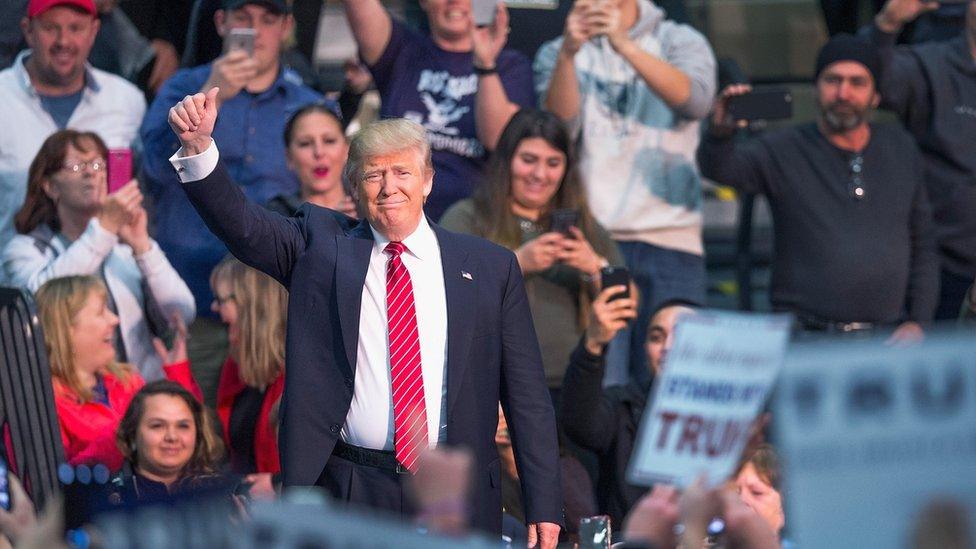Donald Trump softens stance on torture after TV outburst
- Published

Donald Trump has repeatedly advocated the use of water-boarding to interrogate suspects
US Republican front-runner Donald Trump has softened his stance on torture, saying he would not order the military to break international law.
Mr Trump had indicated in a TV debate on Thursday he might order troops to carry out water-boarding "and tougher" on terrorism suspects.
On Friday, he said "as president I will be bound by laws".
The US has now banned water-boarding and it is widely considered a form of torture.
Water-boarding is the practice of pouring water over someone's face to mimic drowning as an interrogation tactic.
US election 2016: Super Tuesday results
The legal classification of water-boarding is not clear, although many human rights and legal experts as well as politicians regard it as torture.
It became debated in the US after the administration of George W Bush said legal counsel allowed it to be used in the interrogation of suspects. However, the practice was later halted.
In the Fox News TV debate for Republican hopefuls on Thursday, Mr Trump said: "Can you imagine? Can you imagine these people, these animals over in the Middle East, that chop off heads, sitting around talking and seeing that we're having a hard problem with water-boarding?
"We should go for water-boarding and we should go tougher than water-boarding,"
When asked what he would do if troops refused to carry out the procedure, he said: "They won't refuse. They're not going to refuse me. Believe me."
But on Friday he issued a much softer statement, saying he would use "every legal power" to stop terrorists.
"I do, however, understand that the United States is bound by laws and treaties and I will not order our military or other officials to violate those laws and will seek their advice on such matters.
"I will not order a military officer to disobey the law."
Conference abandoned
Earlier on Friday, Mr Trump dropped out of a major conservative political conference, opting instead to campaign in Kansas and Florida.
He was scheduled to speak on Saturday at the Conservative Political Action Conference (CPAC), a gathering of conservative activists in Maryland.
Organisers CPAC tweeted: "Very disappointed Donald Trump has decided at the last minute to drop out of CPAC - his choice sends a clear message to conservatives."
His fellow Republican presidential candidates are all expected to speak.
The statement said Mr Trump looked forward to attending next year, "hopefully as president of the United States".
The Romney-Trump bromance turned sour
The decision could further damage an already-strained relationship with the Republican party establishment.
Mr Trump was attacked on Thursday by former Republican presidential candidate Mitt Romney, who remains a central figure within the party.
Mr Romney called the businessman a "phony" and a "fraud" and said his controversial policies threatened to make the world less safe.
At the TV debate, Mr Trump also came under attack from Marco Rubio and Ted Cruz, who criticised him for changing his position on various issues.
Mr Trump admitted he had changed his stance on issues but argued that flexibility was a strength.
Republicans in four states - Kansas, Kentucky, Louisiana and Maine - go to the polls on Saturday. The billionaire has won 10 of the 15 states that have voted so far, with his promise to "make America great again".
Election calendar: Next races
5 March: Kansas caucuses, Louisiana primary, Kentucky and Maine caucuses (Republican), Nebraska caucuses (Democratic)
6 March: Maine caucuses (Democratic)
8 March: Hawaii and Idaho caucuses (Republican), Idaho primary (Republican), Michigan and Mississippi primaries
15 March: Florida, Illinois, Missouri, North Carolina, Ohio primaries